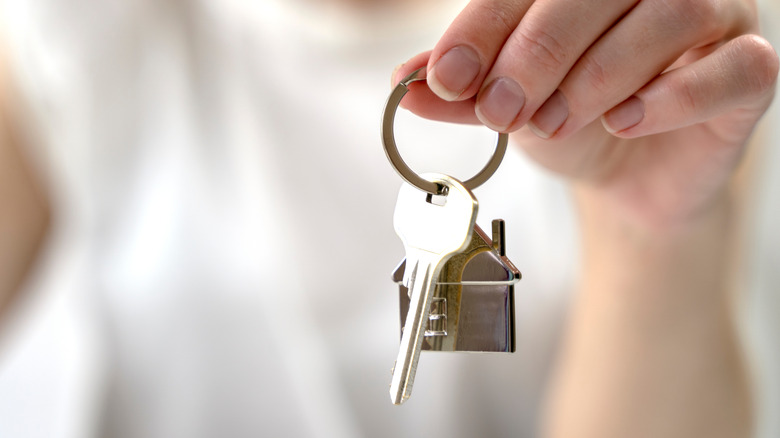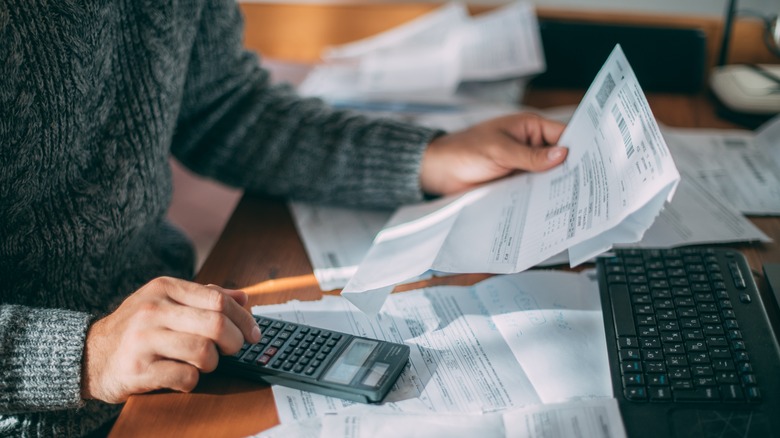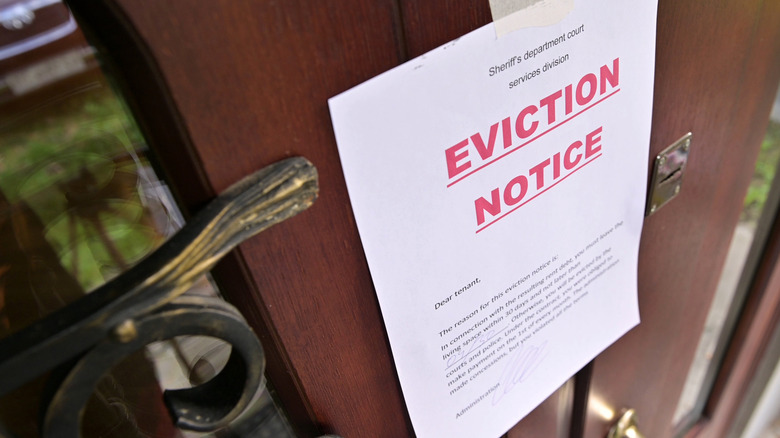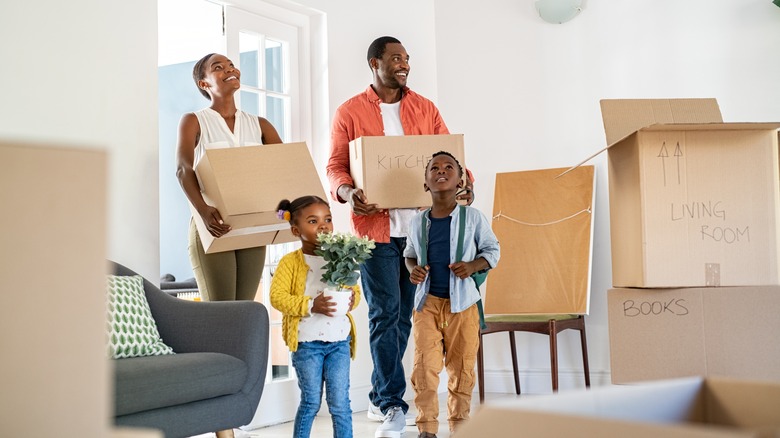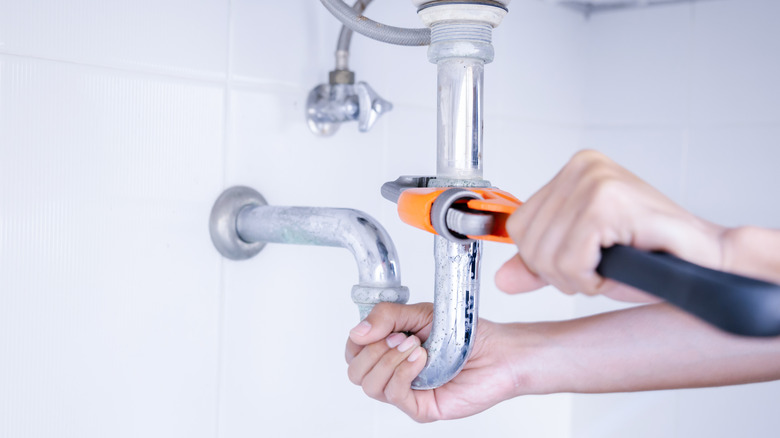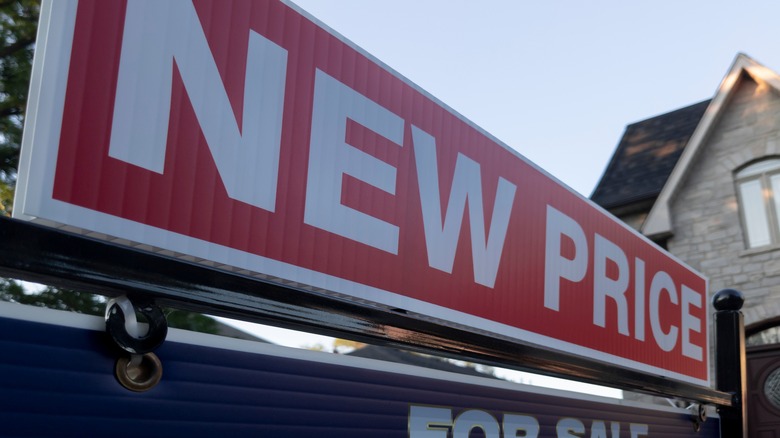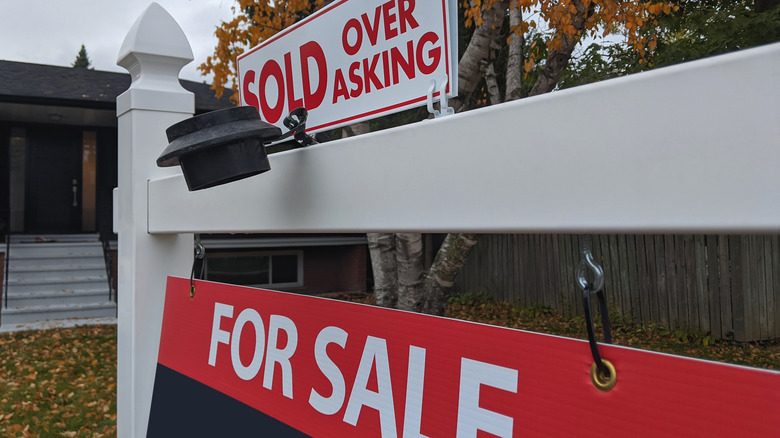5 Pros And 5 Cons Of Rent-To-Own Homes
When you're shopping for a new home, you might see some properties listed as "rent to own," — and you may wonder what that means. It's when you enter into a contract stipulating you can buy the house after renting it for a few years. On the surface, it might seem like a great deal, kind of like home ownership with training wheels. After all, you may be able to get into a rent-to-own home quicker than you could close on a purchase. And doesn't that "rent" part mean you have the option to back out if you decide this isn't your forever home?
Well, maybe yes, maybe no. Rent-to-own home agreements aren't exactly one-size-fits-all. It depends on your contract on how much wiggle room you have. If you have what is called an option-to-buy agreement, you can either decide to bail on the house once your rental term is up (though it'll cost you), or go ahead and buy it. With an obligation-to-buy agreement, if you don't complete the home purchase, you'll not only lose money on the deal, but you could get dragged into court. The Tenant Resource Center strongly advises you to seek legal advice before you enter into either of these agreements, and you should also familiarize yourself with the laws in your state that cover this area. Before you go to such an extent, though, here are a few tips to help you determine whether a rent-to-own home is something you'll even want to consider.
Pro: You get to try before you buy
Assuming you sign an option-to-purchase agreement, the real upside to this is that you will have the length of the lease to familiarize yourself with the home and the neighborhood. This allows you to decide if it's a worthwhile purchase. After all, that's one problem with buying a house — you aren't aware of most issues until you move in. Sure, it may look great when it's staged for the open house, and it may also keep its appeal on subsequent visits, but if you buy your home in the summertime, you won't know just how much cold air comes in through the windows until you've been there a few months. Nor will you realize how noisy the plumbing is in the middle of the night, and you may also not be aware that an annual spring festival just down the road will have strange cars blocking your driveway for a solid week each May.
If you're afraid to commit to buying a home because you're tormented by such possibilities, then yes, an option-to-purchase agreement will afford you some peace of mind. As per a 2022 survey by HomeLight, 70% of new homeowners have some type of buyer's remorse, and an option-to-purchase contract is the closest thing to taking your new home for a test drive.
Con: Changing your mind could cost big bucks
The problem with optioning a rent-to-own home as a safeguard against buyer's remorse is that it doesn't come cheap. The monthly rent charged on a rent-to-own property is typically higher than that same property would rent for without the option to buy. The owner/landlord may charge somewhere in the neighborhood of 20% more as a rent premium. This portion of the rent (although not the entire amount) can go towards reducing the home's purchase price, but if you don't buy, the homeowner is not obligated (and is extremely unlikely) to refund any of this amount.
In addition to higher rent, there could be additional fees involved. Strong Blocks, a Milwaukee-based organization dedicated to getting renters who can't immediately qualify for a home loan into rent-to-own properties, discloses that they charge a fee that is applied to your down payment if you choose to purchase their rental property. If, on the other hand, you decide to pass on the option to purchase, their fee will not be refunded. You could also find yourself in a contract that obligates you to contribute towards property taxes or home insurance premiums, and that money is also not going to come back to you if you don't go through with the purchase.
Pro: Easier to get into with low credit
One of the main reasons people agree to rent-to-own deals is that they are looking to buy a home but cannot qualify for a home loan. This could be due to any number of reasons — perhaps their debt-to-income ratio is still low, maybe their credit scores still need a little boost, or perhaps they're self-employed and earn a decent income but don't have two years' worth of 1040s attesting to that. Whatever the reason, qualifying for a rent-to-own deal is generally much easier than getting a home mortgage.
With this agreement, what you are buying is time. Depending on the length of your rental contract, you may have a year or two to acquire the necessary proof of income, build up your credit, and save money towards closing costs and down payment. As previously mentioned, part, although not all, of your rent, will go towards the down payment, but you'll need to have the remaining balance on hand at the time of closing.
Con: You'll still need to qualify for a loan
Just because you are in a rent-to-own agreement doesn't mean you're home-free (so to speak) when it comes to purchasing the property. You will still need to apply and be approved for a home loan. And now there's a deadline looming — that loan needs to be locked in before your rental term is up, or else there'll be trouble. Don't try to blame the bank, as this excuse won't work. You are the one who entered into an agreement, or at least an option, to purchase the home, so it is your responsibility to ensure that you'll be able to do so when the time comes.
Whatever you do, don't wait until the last minute to deal with the financial stuff! Be proactive about contacting a mortgage lender and find out exactly what steps you need to take for them to be able to approve your loan. While ironing out the paperwork, start saving ASAP to cover the down payment and any closing costs associated with your mortgage loan.
Pro: You're building equity as you rent
One thing about a rent-to-own agreement, should you intend to go through with the home purchase, is that you are actually building equity in the home as you rent. How does this work? Well, equity is the amount of the home you actually own. Suppose you enter into a traditional purchase arrangement with a conventional mortgage. In that case, you may be required to put down a 20% down payment, which means you'll automatically start with 20% equity in your home. In a rent-to-own house, you're not plunking down such a large sum (yet), but any fees or rent premiums put toward the down payment can be considered equity in your home-to-be.
For example, say you're paying $1,200 monthly rent, with $300 going towards the down payment once you purchase the property. Over the course of two years, this is $7,200. If the house costs $400,000, that's 2% of the downpayment, which might not seem like such a large dent. However, if you live in a state with more affordable housing, such as West Virginia, where the median home price is $129,000, you already have 6% down.
Con: Being late on your rent is a really big deal
If you're a renter, you've probably encountered the dreaded lease clause that enables your landlord to charge a fee for late payments. This is typically about 5% of the monthly rent. It can be activated as soon as the day after your rent is due, or as late as five days if there's a grace period. This is a pain in the neck, true, but you're usually not going to be evicted unless you're a habitual non-rent payer. If, on the other hand, you're late with the rent for a rent-to-own property, things can get a lot more serious.
Legal Assistance of Western New York, Inc. cautions anyone considering a rent-to-own property to determine how late payments are handled. It could be possible that missing a payment will not only result in an eviction but also that all of the money meant to go toward the down payment on the house will be forfeited. You might also want to investigate whether the home has been listed as a rent-to-own before and how quickly it was back on the market. LAWNY says they've seen certain properties listed over and over, with the seller finding an excuse to evict tenants partway through the lease so as to hang on to that extra cash and benefit from any "freebie" improvements made by the would-be home buyers.
Pro: You won't have to move once you buy
Moving is no fun whatsoever. For one thing, it's horrendously expensive -– the average in-town move will run you $1,250 these days, so this could be the equivalent of a month's rent or mortgage payment. The stress of moving also takes a toll on both your physical and mental well-being. Plus, there's that good old truism that "three moves equals a fire," meaning that once you've moved three times, you've probably had as many of your possessions lost or damaged as you would if your house had caught fire.
If you were to move to a new area — perhaps to start a new job — and you couldn't commit to purchasing a home right away, you might typically rent a home for a year, then go shopping for a home to buy. With a rent-to-own agreement, however, if everything works out okay and you decide to stay, you don't need to move again since you're already home!
Con: You may be responsible for some home repairs
When you rent a home, the property belongs to your landlord, and they are the ones responsible for general maintenance and upkeep. Sure, your lease could require you to mow the lawn and shovel the sidewalks, but if the toilet won't flush, the refrigerator stops running, or the furnace conks out, it's on the landlord to see that these are repaired. With a rent-to-own home, though, well, you're kind of in a gray area there.
While rent-to-own agreements differ from seller to seller, it's not uncommon that you will be held responsible not just for basic upkeep on the property, but for some or all of the necessary repairs. In an optimal situation, you, the renter, will only need to take care of the minor stuff (leaky faucet), while the landlord will cover the big ones (central a/c system dies). It could also be possible that you'll split the repair costs 50/50, but be wary of any agreement where it's all on you. Remember, you don't own the property until the rental period is up and you've obtained a mortgage and closed on the home, so if anything goes wrong and the sale doesn't go through, you may be out the cost of some very pricey upgrades.
Pro: You can lock in a lower price
Purchasing a rent-to-own home does involve a certain amount of risk, but if the dice roll your way, one optimal outcome is that the home will be worth more than the locked-in price you agree to pay. For example, it's very possible a house worth $220,000 in 2020 can cost $260,000 in 2023, but your purchase price will be the 2020 version since that's when you signed your contract. However, while this is usually the case, it's not the rule. Sometimes there are rent-to-own agreements where the seller is allowed to set a predicted price. That means if they think it will grow in value by $30,000, you will have to pay that price whether it's accurate or not. Always read the fine print!
Still, if you've entered a rent-to-own agreement at a specific purchase price -– let's say $100,000 — then that is exactly what you'll pay for the home, minus any down payment you've already accrued. If the housing market has been hot in your area, it could be that the house is now worth $120,000. Once you've put down a 20% down payment (offset by the rent premiums you've already paid towards this), you will only owe $80,000. This means you'll be starting off with $40,000 in equity, or 33% of what the home is now worth.
Con: You might lock in a higher price
Locking in a price, however, works both ways. It's a gamble for the buyer and the seller, and we've already discussed what happens when you, the buyer, come out on the winning end of the deal. It could be, however, that the seller wins, instead. This will happen if they get you to commit to what the home is worth at the time of the agreement, only to have property values tank. Rising mortgage rates are generally linked to falling prices, and anyone who remembers the late '00s is also aware that every real estate boom tends to be followed by a bust.
Let's posit an opposite scenario to the optimistic one described above — you enter into a rent-to-own agreement when all is sunshine and roses, and your lovely new home-to-be is valued at $100,000. Then the clouds roll in, the market dips, and by the time you're set to buy, the home is worth only $80,000. That means that even when you've put down that $20,000 down payment, you'll have a grand total of 0% equity. On the bright side, though, you'll be dealing with one very happy home seller, so you're sure to see a big smile out of them when it comes time to sign over the property.
